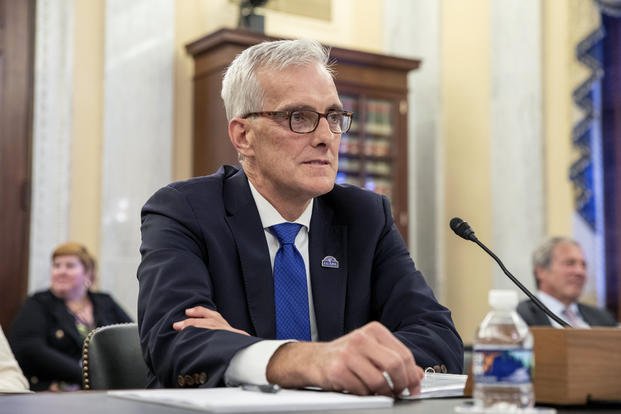Expanding coverage of fertility treatments to veterans whose infertility is not caused by a service-connected injury would lead to "substantial" cost increases for the Department of Veterans Affairs, VA Secretary Denis McDonough told lawmakers Tuesday.
During an appearance before the House Appropriations Committee subpanel in charge of the VA budget, McDonough was asked by Rep. Rosa DeLauro, D-Conn., why the VA does not cover in vitro fertilization for veterans suffering from infertility unless it is caused by a service-connected injury.
"It's a cost issue," McDonough said.
Read Next: Former Marine 'Neo-Nazi' Sentenced to 9 Years in Prison for Firebombing of Planned Parenthood
"It may be that removing the service connection increases costs as much as two orders of magnitude," he continued. "Notwithstanding the very generous funding we get from you and the significantly large budget that you afford VA, growing the program at that rate would be a substantial expansion and costly one."
The VA announced earlier this year that it was expanding eligibility for IVF coverage to single veterans and those in same-sex couples, as well as other couples who need to use donated sperm or eggs. But the benefit is still limited to veterans whose infertility stems from injuries or illnesses related to their military service.
The VA announcement was the result of the Pentagon also expanding its IVF coverage for service members, with VA officials saying the law requires them to follow Defense Department policies in that area. The Pentagon move, which is also limited to service members with service-connected injuries, was a response to a lawsuit filed last year that argued the previous policy discriminated against single people and same-sex couples.
Democrats in Congress praised the VA and the Pentagon announcements, particularly since they were finalized after an Alabama court ruling that equated frozen embryos with children raised fears over the future of access to IVF across America.
But Democrats also pushed the departments to go further, including by lifting the restriction that eligibility is limited to those with service-connected injuries that cause infertility.
"While this is a significant improvement over past policy, I'm concerned about those veterans who may not meet the service connection requirement yet they struggle with infertility," DeLauro, who chairs the full Appropriations Committee, said Tuesday. "With the average cost of IVF being upwards of $20,000 for veteran families that need IVF to build a family but do not have a service-connected injury, that opportunity may be out of reach."
Meanwhile, the VA has also had to contend with some Republicans who have fumed at the expansion of IVF, even as the GOP at large has been trying to send the message that it supports IVF after broad public backlash to the Alabama court ruling.
In a letter to McDonough last month, four House Republicans called IVF "morally dubious" and argued that the procedure "should not be subsidized by the American taxpayer."
"It is well known that IVF treatments result in a surplus of embryos after the best ones are tested and selected," read the letter, which was organized by Rep. Matt Rosendale, R-Mont. "These embryos are then frozen -- at significant cost to the parents -- abandoned or cruelly discarded. Parents' uncertainty of what to do with the additional embryos and inclination to leave them frozen for many years rather than discarding them points to their inherent humanity."














